 Guest editorial by Ernest A. Canning
Guest editorial by Ernest A. Canning
Last September's hearings before the U.S. Senate Judiciary Subcommittee on the Constitution, Civil Rights and Human Rights established that polling place photo ID restriction laws have nothing to do with eliminating "voter fraud."
They are, instead, part of what Judith Browne Dianis, a civil rights litigator at The Advancement Project, described at the time as the "largest legislative effort to roll back voting rights since the post-Reconstruction era" --- part of the partisan, multi-state effort by the billionaire Koch brothers-funded, Paul Weyrich co-founded American Legislative Exchange Council (ALEC)-fueled GOP exercise in voter suppression. Her testimony established, yet again, that such laws have a disparate impact upon minorities, the poor, the elderly and students (all of whom happen to have the unfortunate tendency of voting Democratic).
Despite the national nature of this coordinated, well-documented and well-funded assault on minority voting rights, so far the U.S. Department of Justice (DoJ) has confined its legal response to such newly-enacted laws to only the small number of "covered" jurisdictions, for example, South Carolina, that are subject to Section 5 of the Voting Rights Act (VRA). That section of the law requires federal preclearance for new election-related laws in those "covered" jurisdictions, since they each have demonstrated a long history of racial discrimination.
The narrow action taken by the DoJ to date, as based only on Section 5 of the VRA, could all change if they took the time to study the content of the new complaint, Jones v. Deininger [PDF], as filed last week in the U.S. District Court for the Eastern District of Wisconsin. The complaint alleges that Wisconsin's new polling place photo ID law ("Act 23") "is a voter suppression law that burdens African-American and Latino voters most heavily [which]...results in them having 'less opportunity than other members of the electorate to participate in the political process and to elect representatives of their choice,' and, thereby, constitutes a denial and abridgment of their right to vote in violation of Section 2 of the Voting Rights Act."
The complaint in Jones, which was signed by attorney Charles T. Curtis, Jr. of Arnold & Porter, LLP, seeks to enjoin the implementation of Wisconsin's Act 23 and a declaration that it violates Section 2 of the VRA. When asked whether he contemplates seeking a preliminary injunction on the new law prior to the next election, Curtis was only able to tell The BRAD BLOG at this time that they "want to move the case as quickly as the Court will allow, and plan to request a pretrial conference to discuss motion and briefing schedules."
The additional question remains, however, will the U.S. DoJ defend federal law by opting to join this lawsuit as a plaintiff?...


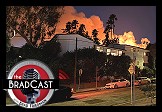 Ordered to Evacuate, But We're Now Home Safe: 'BradCast' 1/9/25
Ordered to Evacuate, But We're Now Home Safe: 'BradCast' 1/9/25 'Green News Report' 1/9/25
'Green News Report' 1/9/25
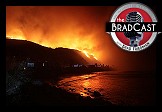 'A Tidal Wave of Fire' in L.A.: 'BradCast' 1/8/25
'A Tidal Wave of Fire' in L.A.: 'BradCast' 1/8/25 Trouble in Trumpland? Broligarchs v. MAGA!: 'BradCast' 1/7/25
Trouble in Trumpland? Broligarchs v. MAGA!: 'BradCast' 1/7/25 'Green News Report' 1/7/25
'Green News Report' 1/7/25 2025 Kicks Off With Both a Bang and a Whimper: 'BradCast' 1/6/25
2025 Kicks Off With Both a Bang and a Whimper: 'BradCast' 1/6/25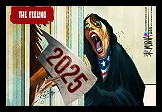 Sunday '2025 Terror, Trump and Tesla' Toons
Sunday '2025 Terror, Trump and Tesla' Toons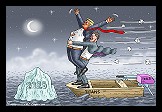 Sunday 'What Could Possible Go Wrong?' Toons
Sunday 'What Could Possible Go Wrong?' Toons Silent Nights, Holy Hell
Silent Nights, Holy Hell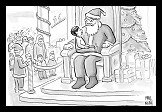 Sunday 'Happyish Holidays' Toons
Sunday 'Happyish Holidays' Toons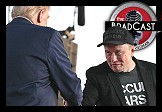 Trump Gets Trumped in Our Musky Year-End Roundtable: 'BradCast' 12/19/24
Trump Gets Trumped in Our Musky Year-End Roundtable: 'BradCast' 12/19/24 'Green News Report' 12/19/24
'Green News Report' 12/19/24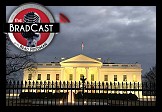 About Some of Trump's 'Day One' Threats: 'BradCast' 12/18/24
About Some of Trump's 'Day One' Threats: 'BradCast' 12/18/24 Trump Family Corruption Cometh...So Does Our Opposition: 'BradCast' 12/17/24
Trump Family Corruption Cometh...So Does Our Opposition: 'BradCast' 12/17/24 'Green News Report' 12/17/24
'Green News Report' 12/17/24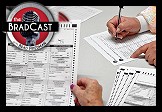 Mistallied Contests Found in OH County, as Oligarchy Rises in D.C.: 'BradCast' 12/16
Mistallied Contests Found in OH County, as Oligarchy Rises in D.C.: 'BradCast' 12/16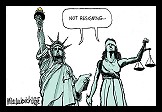 Sunday 'Barrel Bottom' Toons
Sunday 'Barrel Bottom' Toons Trump Admits He Can't Lower Grocery Prices (Biden Just Did): 'BradCast' 12/12/24
Trump Admits He Can't Lower Grocery Prices (Biden Just Did): 'BradCast' 12/12/24 'Green News Report' 12/12/24
'Green News Report' 12/12/24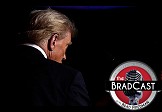 What 'Unprecedented and Powerful Mandate'?: 'BradCast' 12/11/24
What 'Unprecedented and Powerful Mandate'?: 'BradCast' 12/11/24 Trump Barely Won Natl'y, But Won 'News Deserts' By Landslide: 'BradCast' 12/10/24
Trump Barely Won Natl'y, But Won 'News Deserts' By Landslide: 'BradCast' 12/10/24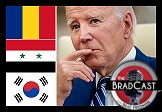 Bad Weekend for Authoritarians; Also: Pardon or Not?: 'BradCast' 12/9/24
Bad Weekend for Authoritarians; Also: Pardon or Not?: 'BradCast' 12/9/24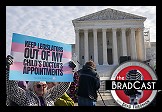 Fox 'News' and GOP Get Their Hateful War on Trans Kids at SCOTUS: 'BradCast' 12/5/24
Fox 'News' and GOP Get Their Hateful War on Trans Kids at SCOTUS: 'BradCast' 12/5/24 'Mind Boggles at Potential Corruption' in Trump Scheme: 'BradCast' 12/4/24
'Mind Boggles at Potential Corruption' in Trump Scheme: 'BradCast' 12/4/24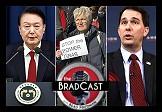 In Defense of Democracy from S. Korea to N. Carolina: 'BradCast' 12/3/24
In Defense of Democracy from S. Korea to N. Carolina: 'BradCast' 12/3/24 Hunter's Pardon: 'BradCast' 12/2/24
Hunter's Pardon: 'BradCast' 12/2/24 How (and Why!) to 'Extend Olive Branch' to MAGA Members: 'BradCast' 11/21/24
How (and Why!) to 'Extend Olive Branch' to MAGA Members: 'BradCast' 11/21/24
 VA GOP VOTER REG FRAUDSTER OFF HOOK
VA GOP VOTER REG FRAUDSTER OFF HOOK Criminal GOP Voter Registration Fraud Probe Expanding in VA
Criminal GOP Voter Registration Fraud Probe Expanding in VA DOJ PROBE SOUGHT AFTER VA ARREST
DOJ PROBE SOUGHT AFTER VA ARREST Arrest in VA: GOP Voter Reg Scandal Widens
Arrest in VA: GOP Voter Reg Scandal Widens ALL TOGETHER: ROVE, SPROUL, KOCHS, RNC
ALL TOGETHER: ROVE, SPROUL, KOCHS, RNC LATimes: RNC's 'Fired' Sproul Working for Repubs in 'as Many as 30 States'
LATimes: RNC's 'Fired' Sproul Working for Repubs in 'as Many as 30 States' 'Fired' Sproul Group 'Cloned', Still Working for Republicans in At Least 10 States
'Fired' Sproul Group 'Cloned', Still Working for Republicans in At Least 10 States FINALLY: FOX ON GOP REG FRAUD SCANDAL
FINALLY: FOX ON GOP REG FRAUD SCANDAL COLORADO FOLLOWS FLORIDA WITH GOP CRIMINAL INVESTIGATION
COLORADO FOLLOWS FLORIDA WITH GOP CRIMINAL INVESTIGATION CRIMINAL PROBE LAUNCHED INTO GOP VOTER REGISTRATION FRAUD SCANDAL IN FL
CRIMINAL PROBE LAUNCHED INTO GOP VOTER REGISTRATION FRAUD SCANDAL IN FL Brad Breaks PA Photo ID & GOP Registration Fraud Scandal News on Hartmann TV
Brad Breaks PA Photo ID & GOP Registration Fraud Scandal News on Hartmann TV  CAUGHT ON TAPE: COORDINATED NATIONWIDE GOP VOTER REG SCAM
CAUGHT ON TAPE: COORDINATED NATIONWIDE GOP VOTER REG SCAM CRIMINAL ELECTION FRAUD COMPLAINT FILED AGAINST GOP 'FRAUD' FIRM
CRIMINAL ELECTION FRAUD COMPLAINT FILED AGAINST GOP 'FRAUD' FIRM RICK SCOTT GETS ROLLED IN GOP REGISTRATION FRAUD SCANDAL
RICK SCOTT GETS ROLLED IN GOP REGISTRATION FRAUD SCANDAL VIDEO: Brad Breaks GOP Reg Fraud Scandal on Hartmann TV
VIDEO: Brad Breaks GOP Reg Fraud Scandal on Hartmann TV RNC FIRES NATIONAL VOTER REGISTRATION FIRM FOR FRAUD
RNC FIRES NATIONAL VOTER REGISTRATION FIRM FOR FRAUD EXCLUSIVE: Intvw w/ FL Official Who First Discovered GOP Reg Fraud
EXCLUSIVE: Intvw w/ FL Official Who First Discovered GOP Reg Fraud GOP REGISTRATION FRAUD FOUND IN FL
GOP REGISTRATION FRAUD FOUND IN FL



















 Mike has the night off! So we're back tonight guest-hosting the nationally-syndicated
Mike has the night off! So we're back tonight guest-hosting the nationally-syndicated 
 Well, golly, who coulda seen
Well, golly, who coulda seen  While the GOP and its operatives have been on a tear over the last year (and many more), falsely claiming an epidemic of Democratic "voter fraud" meriting the potential disenfranchisement of tens of thousands of legal (and mostly Democratic) voters through polling place Photo ID restriction laws in order stop it, the recent spate of actual voter fraud by high profile Republicans --- both alleged-with-much-evidence and actually-proven-in-a-court-of-law --- continues apace.
While the GOP and its operatives have been on a tear over the last year (and many more), falsely claiming an epidemic of Democratic "voter fraud" meriting the potential disenfranchisement of tens of thousands of legal (and mostly Democratic) voters through polling place Photo ID restriction laws in order stop it, the recent spate of actual voter fraud by high profile Republicans --- both alleged-with-much-evidence and actually-proven-in-a-court-of-law --- continues apace.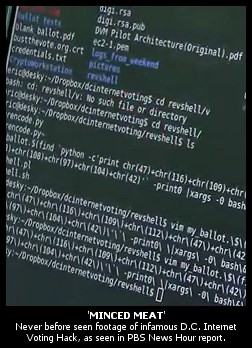 Brad Friedman has often compared the task of Election Integrity (EI) advocates to a game of
Brad Friedman has often compared the task of Election Integrity (EI) advocates to a game of  It figures. The one time we're on the road and unable to keep up with things on a minute-by-minute basis, a major election would be stolen outright. And there's not a disenfranchising polling place Photo ID restriction in the world that could have done a thing to stop the thieves.
It figures. The one time we're on the road and unable to keep up with things on a minute-by-minute basis, a major election would be stolen outright. And there's not a disenfranchising polling place Photo ID restriction in the world that could have done a thing to stop the thieves. The state GOP itself has stolen the state for Mitt Romney in Maine's 2012 Caucuses. Period.
The state GOP itself has stolen the state for Mitt Romney in Maine's 2012 Caucuses. Period.
 The chief election official in the very first state in the nation to implement polling place Photo ID restrictions --- under the guise of preventing "voter fraud" --- has been found guilty of three counts of felony voter fraud today.
The chief election official in the very first state in the nation to implement polling place Photo ID restrictions --- under the guise of preventing "voter fraud" --- has been found guilty of three counts of felony voter fraud today. [Now UPDATED at bottom of article.]
[Now UPDATED at bottom of article.] By the way, the exclusive by Fang --- formerly of
By the way, the exclusive by Fang --- formerly of  There are at least a dozen things in
There are at least a dozen things in  Had the same thing been carried out by a worker for the now-defunct ACORN, Republicans --- and even Newt Gingrich --- would have called it massive "voter fraud." But the 1,500 acts of fraud, by Gingrich's own admission, were carried out by a worker hired by his campaign, so it seems the media have barely noticed it.
Had the same thing been carried out by a worker for the now-defunct ACORN, Republicans --- and even Newt Gingrich --- would have called it massive "voter fraud." But the 1,500 acts of fraud, by Gingrich's own admission, were carried out by a worker hired by his campaign, so it seems the media have barely noticed it. To paraphrase
To paraphrase  Ohio's Republican Sec. of State Jon Husted has called on fellow Republicans in the legislature
Ohio's Republican Sec. of State Jon Husted has called on fellow Republicans in the legislature













